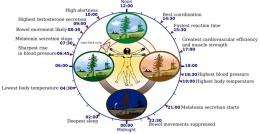December 16, 2010 report
New chemical may lead to jet lag drug

(PhysOrg.com) -- Jet lag, as every long-distance airline passenger knows, disrupts the body's normal circadian rhythms, or body clocks, and causes some very unpleasant effects such as disturbed sleep and fatigue. Now scientists in the US have isolated a chemical that could lead to the development of a drug to combat jet lag.
Dr. Steve Kay, dean of the Division of Biological Sciences of the University of California, San Diego (UCSD), said our body clocks are "a symphony of biological rhythms in all of our different organs." The body clock in the brain controls the cycles of sleeping and waking and changes in body temperature, the cardiovascular system has a body clock controlling blood pressure. Another body clock controls metabolic rhythms.
Dr. Kay explained that in jet lag these rhythms no longer play together "as an orchestra" and that is why it makes us feel so bad. Flying across several time zones, shift work, and other disruptions to the body clocks have also been linked to conditions such as diabetes, cardiovascular disease, and some forms of cancer.
The research team began to look for chemicals that affect the body clocks by taking a gene that causes fireflies to glow and inserting it into human bone cancer cells. This created cells that glowed when their biological clocks were activated. They then used a robot to test around 120,000 chemical compounds for their effects on the cycle of glowing in the cells. In this way they discovered a naturally occurring chemical, which they called "longdaysin," that slowed down the cycle considerably.
Longdaysin is a derivative of a purine, which is a common aromatic organic compound. The researchers found several other compounds that also affected the biological clock, but longdaysin had the most dramatic effect. It was also found to alter the biological clock in tissues isolated from mice, and lengthened the biological clock in larval zebrafish by over 10 hours.
Dr. Kay said longdaysin will be an effective tool for research, and it, or molecules like it, may become a component of drugs for jet lag within around 15 years. The drugs would slow down or speed up the body clocks for a short period to allow the body to adjust to the new time zone or new shift. The drugs could also be used for sleep disorders like Familial Advanced Sleep syndrome, a genetic disorder in which the body clocks run too fast.
The research paper is available online in the journal PLoS Biology.
More information: Hirota T, Lee JW, Lewis WG, Zhang EE, Breton G, et al. (2010) High-Throughput Chemical Screen Identifies a Novel Potent Modulator of Cellular Circadian Rhythms and Reveals CKIa as a Clock Regulatory Kinase. PLoS Biology 8(12): e1000559. doi:10.1371/journal.pbio.1000559
© 2010 PhysOrg.com


















